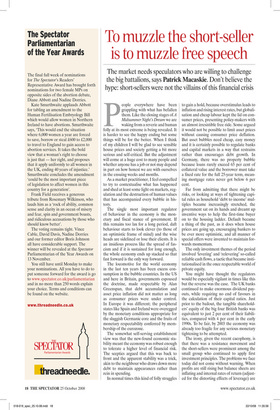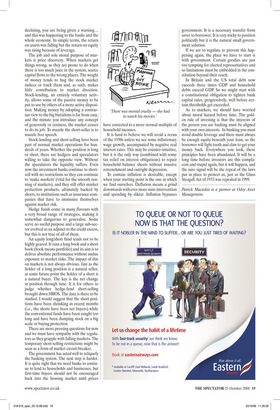To muzzle the short-seller is to muzzle free speech
The market needs speculators who are willing to challenge the big battalions, says Patrick Macaskie. Don’t believe the hype: short-sellers were not the villains of this financial crisis People everywhere have been grappling with what has befallen them. Like the closing stages of A Midsummer Night’s Dream we are waking from a reverie and human folly at its most extreme is being revealed. It is harder to see the happy ending but some things will be for the better. When I think of my children I will be glad to see sensible house prices and society getting a bit more serious and self-critical. But the adjustment will come at a huge cost to many people and whether anyone has a job or not may depend in part on how honest we are with ourselves in the ensuing weeks and months.
As a market practitioner, I feel compelled to try to contextualise what has happened and shed at least some light on markets, regulation and the destruction of human values that has accompanied every bubble in history.
The single most important regulator of behaviour in the economy is the monetary and fiscal stance of government. If this remains too lax for a long period, daft behaviour starts to look clever (to those of an optimistic frame of mind) and the wise heads are sidelined or lose their clients. It is an insidious process like the spread of fascism and if it is sustained for long enough, the whole economy ends up stacked so that fast forward is the only way forward.
The locomotive for the world economy in the last ten years has been excess consumption in the bubble countries. In the US and here in Britain, governments espoused the doctrine, made respectable by Alan Greenspan, that debt accumulation and asset price inflation did not matter as long as consumer prices were under control. In Europe it was different; the peripheral states like Spain and Ireland were overegged by the monetary conditions appropriate for the sluggish Germanic core and the fruits of monetary respectability conferred by membership of the eurozone.
The somewhat self-serving establishment view was that the new-found economic stability meant the economy was robust enough to tolerate a higher level of financial risk. The sceptics argued that this was back to front and the apparent stability was a trick, akin to the neighbour who draws down more debt to maintain appearances rather than rein in spending.
In normal times this kind of folly struggles to gain a hold, because overstimulus leads to inflation and rising interest rates, but globalisation and cheap labour kept the lid on consumer prices, presenting policy-makers with an almost irresistible free ride. Some argued it would not be possible to limit asset prices without causing consumer price deflation. But asset bubbles need cheap, easy money and it is certainly possible to regulate banks and capital markets in a way that restrains rather than encourages debt growth. In Germany, there was no property bubble because loans rarely exceed 65 per cent of collateral value and the borrower must take a fixed rate for the full 25-year term, meaning mortgage rates never got below 6 per cent.
Far from admitting that there might be risks, or looking at ways of tightening capital rules as household ‘debt to income’ multiples became increasingly stretched, the government sat on its hands and dreamt up inventive ways to help the first-time buyer on to the housing ladder. Default became a thing of the past, as it does when house prices are going up, encouraging bankers to be ever more optimistic, and all manner of special offers were invented to maintain forwards momentum.
The only investment themes of the period involved ‘levering’ and ‘relevering’ so-called reliable cash flows, a tactic that became institutionalised in the once respectable world of private equity.
You might have thought the regulators would be especially vigilant in times like this but the reverse was the case. The UK banks continued to make enormous dividend payouts, while requiring no end of favours in the calculation of their capital ratios. Just prior to the bailout, the tangible shareholders’ equity of the big four British banks was equivalent to just 2 per cent of their liabilities, compared with 4 per cent in the early 1990s. To be fair, by 2003 the economy was already too fragile for any serious monetary tightening to be attempted.
The irony, given the recent cacophony, is that there was a resistance movement and the short-sellers were prominent among the small group who continued to apply first investment principles. The problems we face today did not come without warning. When profits are still rising but balance sheets are inflating and internal rates of return (adjusted for the distorting effects of leverage) are declining, you are being given a warning... and this was happening to the banks and the whole economy. In simple terms, the return on assets was falling but the return on equity was rising because of leverage.
The job and sole moral purpose of markets is price discovery. When markets get things wrong, as they are prone to do when there is too much juice in the system, scarce capital flows to the wrong places. The weight of money tends to hug the stock market indices or track them and, as such, makes little contribution to market direction. Stock-lending, an entirely voluntary activity, allows some of the passive money to be put to use by others of a more active disposition. Making money by adopting a contrarian view to the big battalions is far from easy, and the minute you introduce any concept of generosity or cosiness, the market ceases to do its job. To muzzle the short-seller is to muzzle free speech.
Stock-lending and short-selling have been part of normal market operations for hundreds of years. Whether the position is long or short, there are hedgers and speculators willing to take the opposite view. Without the speculators the liquidity suffers. Even now the investment banks continue to shortsell with no restrictions so they can continue to ‘make markets’ (vital for the smooth running of markets), and they still offer market protection products, ultimately backed by shorts, to institutions such as insurance companies that have to immunise themselves against market risk.
Hedge funds come in many flavours with a very broad range of strategies, making it somewhat dangerous to generalise. Some serve no useful purpose and a large sub-sector evolved as an adjunct to the credit excess, but this is not true of all of them.
An equity long/short fund tends not to be highly geared. It runs a long book and a short book (book means portfolio) and its aim is to deliver absolute performance without undue exposure to market risks. The impact of this on markets is not always obvious. Just as the holder of a long position is a natural seller, at some future point the holder of a short is a natural buyer. The key is the net change in position through time. It is for others to judge whether hedge-fund short-selling brought down HBOS. The data is there to be studied. I would suggest that the short positions have been shrinking in recent months (i.e., the shorts have been net buyers) while the conventional funds have been caught too long and have been dumping stock on a big scale or buying protection.
There are more pressing questions for now and we must have sympathy with the regulators as they grapple with falling markets. The temporary short-selling restrictions might be seen as a form of market circuit-breaker.
The government has acted well to reliquefy the banking system. The next step is harder. It is quite right that we need banks to continue to lend to households and businesses, but first-time buyers should not be encouraged back into the housing market until prices have corrected to a more normal multiple of household incomes.
It is hard to believe we will avoid a rerun of the 1930s unless we see some inflationary wage growth, accompanied by negative real interest rates. This may be counter-intuitive, but it is the only way (combined with some tax relief on interest obligations) to repair household balance sheets without massive retrenchment and outright depression.
To contain inflation is desirable, except when your starting point is the one in which we find ourselves. Deflation means a grind downwards with ever more state intervention and spending by diktat. Inflation bypasses government. It is a necessary transfer from saver to borrower. It is very tricky to position politically but it is the natural small government solution.
If we are to regulate to prevent this happening again, the place we have to start is with government. Certain goodies are just too tempting for elected representatives and so limitations must be embedded in the constitution beyond their reach.
In Britain and the US total debt now exceeds three times GDP and household debts exceed GDP. So we might start with a constitutional obligation to tighten bank capital rules, progressively, well before certain thresholds get exceeded.
As to markets, we should have worried about moral hazard before time. The golden rule of investing is that the interests of the person you are backing must be aligned with your own interests. In banking you must avoid double leverage and there must always be enough equity beneath your loan, so the borrower will fight tooth and claw to get your money back. Everywhere you look, these principles have been abandoned. It will be a long time before investors are this complacent and stupid again, but it will happen, and the sure signal will be the repeal of the laws put in place to protect us, just as the Glass Steagall Act of 1933 was repealed in 1999.
Patrick Macaskie is a partner at Odey Asset Management.



















































































 Previous page
Previous page